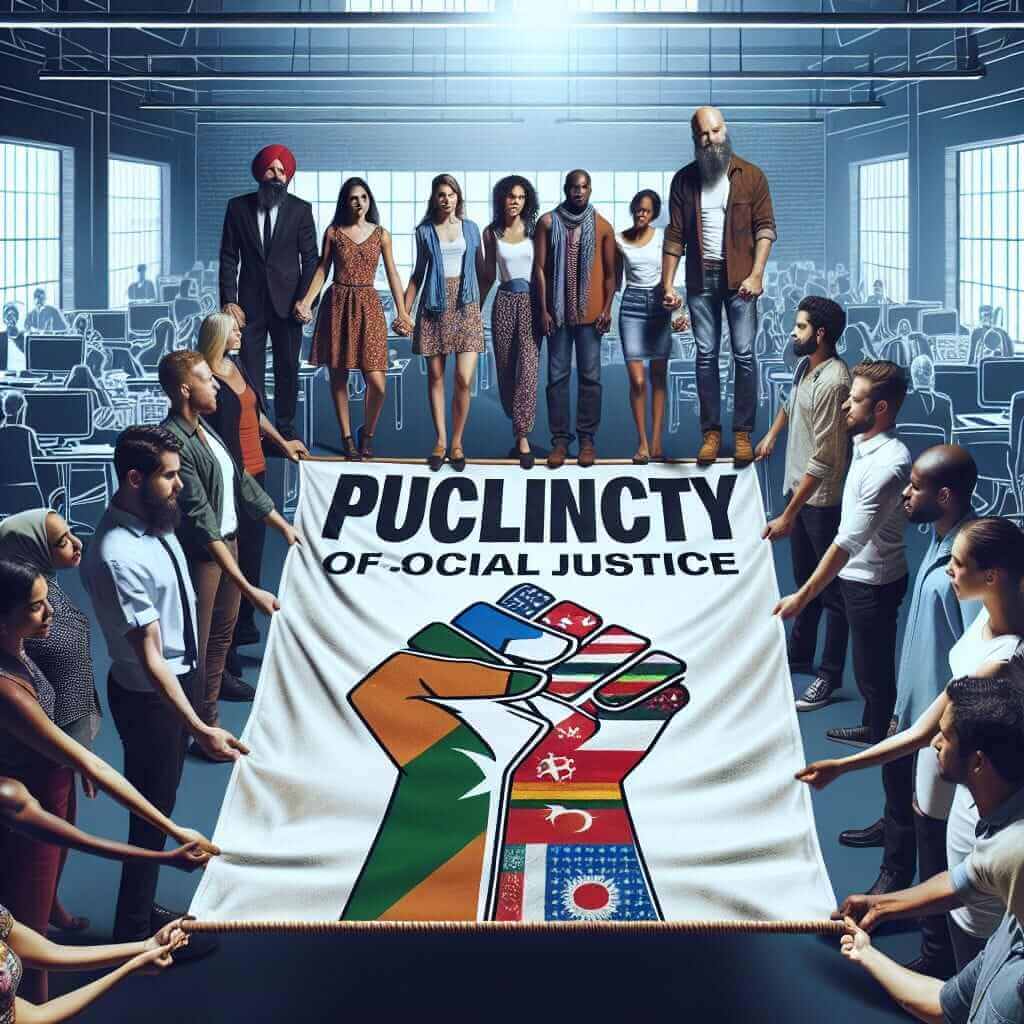The IELTS Reading test is designed to assess a variety of reading skills such as reading for gist, reading for main ideas, reading for detail, skimming, understanding logical argument, and recognizing writers’ opinions, attitudes, and purpose. One recurring theme that students may encounter is “Challenges in achieving social justice.” This topic, rooted in both historical and current events, has repeatedly appeared in various IELTS reading passages due to its relevance and importance in societal discourse.
Based on historical data and its prevalent nature, understanding this theme can better prepare you for your IELTS exam. This guide will delve into a sample reading passage, tailored questions, answer keys, and key vocabulary and grammar considerations—all structured to enhance your readiness for the test.
Mock Reading Passage
Below is a reading passage on the challenges in achieving social justice, formatted to mimic the IELTS exam structure. This passage is categorized as a Medium Text.
Challenges in Achieving Social Justice
Social justice, often defined as the equitable distribution of wealth, opportunities, and privileges within a society, remains a highly contentious issue globally. Despite numerous efforts and movements dedicated to advancing social equality, several formidable challenges persist.
A primary obstacle to social justice is systemic inequality. Systems entrenched in societies, such as education, healthcare, and judicial systems, often reflect and perpetuate historical inequities. For instance, marginalized groups frequently face barriers to accessing quality education, leading to restricted career opportunities and economic mobility. This vicious cycle of deprivation and discrimination is difficult to break.
Moreover, the legal frameworks and policies intended to promote social justice sometimes fall short of addressing deeply-rooted biases. Laws may lack enforcement mechanisms or may be applied inconsistently, undermining their effectiveness. Community organizations play a pivotal role in bridging these gaps. They often work at the grassroots level, advocating for policy changes that better reflect the needs of disadvantaged populations.
Furthermore, achieving social justice is compounded by social and cultural resistance. Prejudices and stereotypes can influence public opinion and policy-making, creating an environment where injustices are normalized. Activists and social movements, therefore, face significant opposition and must work tirelessly to shift societal perceptions.
The role of global economic structures also cannot be overlooked. Globalization has created unprecedented economic opportunities, yet it has also exacerbated wealth disparities. Multinational corporations and affluent countries often dictate terms that favor their interests, making it difficult for poorer nations to achieve fair economic justice.
Despite these challenges, strides towards social justice continue. Advocates leverage technology and social media to raise awareness and mobilize support, highlighting that collective action can spur significant change.

Through persistent efforts and cross-sector collaboration, a more just society remains an achievable goal, albeit with considerable obstacles to overcome.
Reading Questions
Multiple Choice
- What is a primary obstacle to social justice mentioned in the passage?
a. Global economic opportunities
b. Lack of community organizations
c. Systemic inequality
d. Technological advancements
Identifying Information (True/False/Not Given)
- Marginalized groups generally have equal access to quality education.
a. True
b. False
c. Not Given
Sentence Completion
- Prejudices and stereotypes can influence ___ and policy-making, normalizing injustices.
Matching Information
-
Match the following challenges to their descriptions:
-
Systemic Inequality
-
Legal Frameworks
-
Social and Cultural Resistance
-
Global Economic Structures
-
A. Economy dictated by affluent countries
-
B. Prejudices affecting public opinion
-
C. Policies lacking enforcement mechanisms
-
D. Restricted career opportunities due to poor education
-
Summary Completion
Complete the summary below using words from the box.
Systemic inequalities, legal frameworks, cultural resistance, and global economic structures are key challenges in achieving social justice. Despite these obstacles, advocates leverage and to raise awareness and push for change.
Answer Key and Explanations
- c. Systemic inequality – This is explicitly mentioned as a primary obstacle in the passage.
- False – The passage indicates marginalized groups face barriers to accessing quality education.
- public opinion – The passage discusses how public opinion and policy-making can be influenced by stereotypes and prejudices.
-
- Systemic Inequality – D
- Legal Frameworks – C
- Social and Cultural Resistance – B
- Global Economic Structures – A
- technology, social media
Common Mistakes
Many test-takers struggle with:
- Skimming vs. Scanning – Ensure you know when to quickly skim for gist and when to carefully scan for details.
- Keyword Matching – Focus on synonyms and related concepts rather than exact words.
- Understanding Context – Always read the surrounding sentences to better grasp the meaning of specific parts.
Key Vocabulary
- Equitable (adj) /ˈɛkwɪtəbl/: Fair and impartial.
- Systemic (adj) /sɪˈstɛmɪk/: Relating to a system, especially as opposed to a particular part.
- Marginalized (adj) /ˈmɑːrdʒɪnəˌlaɪzd/: Treated as insignificant or peripheral.
- Advocating (v) /ˈædvəˌkeɪtɪŋ/: Publicly recommend or support.
- Perpetuate (v) /pəˈpɛtʃuˌeɪt/: Make (something) continue indefinitely.
Grammar Spotlight
Relative Clauses
Example from Text: “Systems entrenched in societies, such as education, healthcare, and judicial systems, often reflect and perpetuate historical inequities.”
Formula:
- Clause starting with ‘who,’ ‘which,’ ‘that,’ etc.
- Provides additional information without starting a new sentence.
Passive Voice
Example from Text: “Opportunities and privileges within a society are highly contentious issues.”
Formula:
- [Verb to be] + [past participle]
Example:
- Active: The policy makers address the issues.
- Passive: The issues are addressed by the policy makers.
Final Advice
For a high IELTS Reading score, practice consistently with diverse topics. Focus on developing both speed and accuracy, enhance your vocabulary range, and apply grammar correctly. Make use of online resources such as The Role of Community Organizations in Social Justice and The Role of Grassroots Movements in Social Change for further reading and understanding. Happy studying!